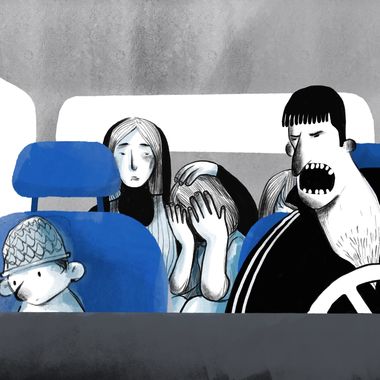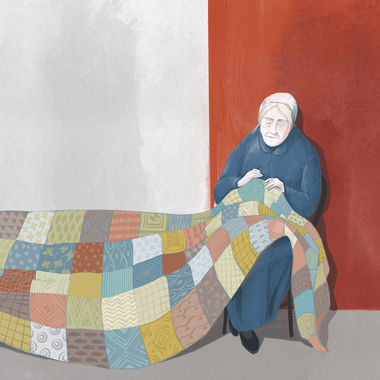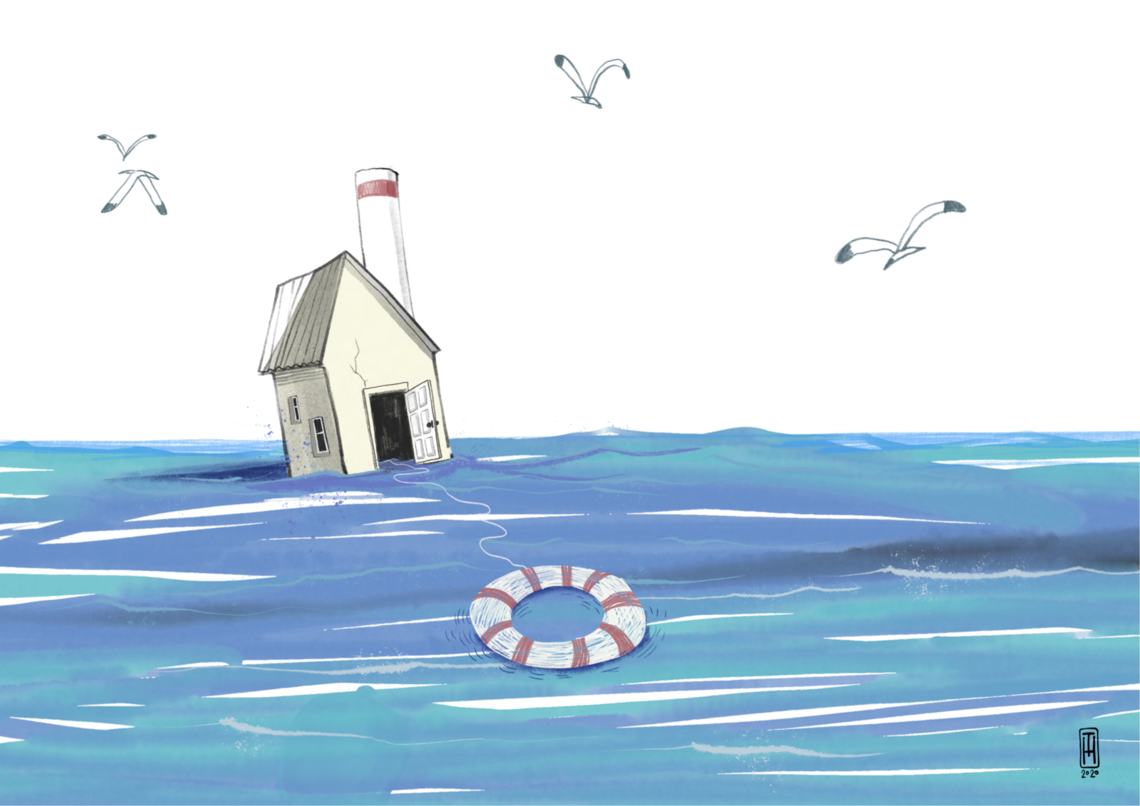
Stay home, they tell you, but you have no home. Even vagabonds are eventually homebound, but you are homeless.
We’re not from the same home, but we’re in the same boat. We both have an issue with what they call “home”. You are one of a hundred million homeless people, I’m one of ten million Armenians spread around the world. You live in ashes, in the lantern of life. We live in a burning home, equating it with our hearth. Armenians don’t have homes, they have hearths. Although you can also find Armenians that are hearthless.
So when the calls to “come home”[1] grew pointless, and when the world locked down with calls of “stay home”, when that wolf of a virus knocked in turn on the doors of the pig that made a house of straw, the one that made a house of sticks, and the one that made a house of bricks, and it seemed like the unsafe outdoors had once again lost the battle to the home fortress, when our noble tribe of street protesters caught up with the rest of humanity and tried to simmer in our own hearths, I decided to finally bring you home, or rather, keep you home.
This seemed like an easy task at first. Here’s a simple option – like those houses that kids draw. A rectangle with a triangle on top, and everything is in place – four walls and a roof, a door and windows, a chimney perhaps, but not necessarily. Who wouldn’t want to live in one of those houses that kids draw? You didn’t want to.
Hmm, perhaps it was too cut off from the rest of the world. Okay, here’s a bright sun, a blue sky, trees and flowers all around, a couple of people wearing the latest fashion in the Spring-Summer 2020 season – face masks and gloves (do you want a backdrop of Mount Ararat, a couple of plane trees, and a stork as well? No? As you wish). The address is unknown, but it is a modern place. Well? Step inside, lock the door, stay home, save lives.
But you did not want to lock yourself in my house in the air. It wasn’t a castle in the sky like Miyazaki’s whimsical Laputa, but more like something from Ararat Minasyan’s “Philosophy of everyday life” series, where an uprooted high-rise building or house has been placed in a plastic bag.
I don’t give up. I fill the inside of the place with memories of my childhood home. There’s that old radio that kept hissing endlessly, the fluttering curtain, the pattern on the blanket—or was it the tablecloth? I can’t remember—my hidey-hole, the cracks in the corner that turned into evil monsters, I even place the teacup holders in the chipped cupboard. To give it a lived-in feeling, I fill it with all kinds of tastes and smells – I hang pieces of dried apple on a string here and there, I put onions in the fireplace to roast (how I hated them), and if my nose could take in the grandma-grandpa smell that had seeped into the walls, I would have remembered it for sure but, alas, it has not been around anywhere for such a long, long time.
It isn’t coming together – the gaps are too wide, you can’t lock yourself in here. My first home is deleted before my very eyes and remains indelible.
Is it worth turning the chicken into the egg, the tree into the seed, or the person into the story of his childhood home? That sweet home that many of us consumed because we were Hansel and Gretel, because childhood homes are always delicious, they always beckon to us in an opening as we roam hungrily through a thick forest, even if we grew up with nights cramped up in a narrow space in a slum.
Everyone has one of them – a trilingual primary space, a pre-world, a shelter or nook near the sky, a cellar that housed our oldest fears, a corner of refuge and solitude. But, although Tumanyan talked about “the best home in all cases…”[2] you come to realize that sometimes it does not exist. Mine is in ruins now, it was in one of the sanatoriums that existed in the Kamo region,[3] where my grandmother and grandfather were teachers. Ruins that I did not have the strength to enter when I was passing by years ago. I cannot accommodate you in a dream woven from the rags of my paradise lost.
I don’t give up. Here’s a house that is still standing, and with a clear address too – it’s in Yerevan, Arzumanyan Street 4, fourth entrance, top floor, the door on the right. I would step outside the building, cross the street, and walk into school. Our Khrushchyovka in the Ajapnyak district, where three generations lived together, packed like sardines, was a place of constant discomfort. Similar to one of those matchboxes that could stretch like rubber, we could accommodate dozens of people if needed, where we would sit around the table for lunch which had held grandma’s coffin just days ago, where the grandchildren would finally be able to stretch out and sleep on what had been her deathbed, having to walk over their village relatives lying on the floor to wash their faces in the bathroom the next morning. In a word, this was the house where going up the stairs happened two or three steps at a time, where coming down meant a large leap over the last four – the house whose every inch I know by heart.
I won’t invite you there (it’s occupied, it belongs to my aunt now) but I keep you in a similar empty apartment and wait to see what happens. A knock on the door. The stranger says something about a scientific experiment and advertising, gives you the liquid known as “Quadraturin” (exactly as in Sigizmund Krzhizhanovsky’s story of the same name), which you have to rub on the walls, floor, and ceiling of the house so that you later find yourself in the darkness of your irregularly growing room.
I’m the writer here and I know well that I cannot save you by paying tribute to Krzhizhanovsky, but I nonetheless fill all the old furniture from our old home into the emptiness of your room. I even place one of those old rotary phones on an embroidered placemat, the wooden elephants that had been on top of the piano but were lost without a trace as we moved from house to house, the rustling Vietnamese bead curtain, the jug of the boy on the buffalo (his hat was the bottlecap and the liquid flowed from the buffalo’s mouth), the preserve jars with raisins and chocolates lying in wait for Christmas stockings, the heavy coffee grinder that I would spin nonstop for countless hours, and all kinds of other innumerable and numberless trinkets, I even cast the drip-drip-drips of the broken faucet and the fresh smell of pickles into the all-consuming maw of your home, but it is all in vain – that terrifying, dark abyss swallows everything.
In our next imitation of a home (Davtashen, second quarter, building 13, eleventh floor – a three-bedroom apartment), you fall ill immediately. This is the home with the jammed garbage chute, the house that rattled when the wind blew – one of those paneled structures with papery walls, that often turned into cinemas and eateries, where The Rich Cry Too[4] in the evenings, always at the same time, in the small television connected to a car battery, where they would come to ask for a bit of salt but would not leave until the fire went out, where they would make whitefish tolma on special occasions, where mothers would catch their pimply sons in the act but say nothing, and fathers would notice their brassiered daughters swiping cigarettes. Basically, the home where the elevator would constantly need repair and take turns holding residents captive, where I slept with all my clothes on for two winters and spent two summers with the hope that I was done with school, and it later turned out that this place was just big enough for my university friends to spend the night, drawing and writing what their hearts desired on the walls of my room.
You fused into this space, which grew smaller and smaller (this is also a well-known story, which was best told in Michel Gondry’s Mood Indigo, based on Boris Vian’s novel Froth on the Daydream) such that you suffocated as the walls closed in, crushed by the thicket of flowers that was growing with your disease.
It’s obvious that I tried to keep you locked in imitations of all the homes where I lived, isn’t it? My home at the edge of the village where we did not have indoor plumbing and had to go at night to the outhouse on top of the hill, heedful of the howling of wolves, where you proceeded to fall into the hole and immediately ended your life. The hotels and literary residencies, which became a second home in the short space of a couple of months, where you died of boredom, or perhaps of the unfamiliar surroundings. That semi-basement in Kurtuluş where you hanged yourself when you saw graffiti in Armenian on the walls in the street with the question “Where is our home?” My homes always end up killing you.
It should have been possible to easily accommodate you within four pages of prose, so why can’t I do it? Perhaps I am trying to overcome this impossible task of bounding a vagabond to a home so that I can come at least a few steps closer to answering some of the questions that bother me – why couldn’t those hearth-loving housecat-like Armenians (or rather, the Armenians of Armenia) just sit tight within their four walls when they could have become “heroes” by simply staying home, why did they have to turn into Kipling’s cat that walked by himself? They had grown up as residents in this home country where the hearth was of central importance, so why did many of these people become so indifferent to those that shared the same home with them, why did they show such a callous attitude? Doesn’t charity begin at home?
Hm. Could we blame our naïve tribe, the same one that treats cancer with garlic and baking soda? Wasn’t it the consistent devaluation of human life that turned our homes into prisons and tombs, where it is more important to buy a new cupboard than pay for surgery to treat the nagging hernia of a family member?
So, why did we use this fateful moment, which we have called a “war” and suddenly start to construct a whole new range of prison buildings at the cost of destroying our own homes, destroying the old houses in Yerevan[5] that had miraculously survived? Why were the rulers that promoted the idea of this hearth-centered state so indifferent toward the “elderly” homes among us, why was their attitude so callous? After all, it was obvious that responsible city residents who had unwillingly become hikikomoris would not be able to save the lives of those homes, wasn’t it?
Perhaps a hearth ceases to be a home when it is extinguished. Perhaps a hearth is priceless, while a home is worth a measly price. Perhaps we do not respect old age, although our everyday talk draws from the centuries, perhaps we want the elderly to die as soon as possible—irrespective of whether they are people, or homes—so that we can then mourn their loss. Perhaps I was wrong and Vano Siradeghyan was right – perhaps what we want is not to return home, but simply to yearn for it, to feel homesick. No, you’re going to stay in the home that I have built, you home-destroying runt.
Is it worth turning the fowl into flight, the tree into fruit, or the person into the story of the home of her or his dreams? That wonderful home that consumed many of us, because paying a mortgage for decades is no child’s play, because the aching for settling down and not being home alone (as unmarried girls are labelled) is something we have absorbed with our mother’s milk, and in these parts where the father is the head, we have always sought a motherly space, a warm embrace, even if all it ends up being is a forty-square-meter piece in the outskirts of the city.
Everyone has one of them – their constantly transforming floor plan, their home world, the kitchen that is the stage for their cooking and cleaning, the bedroom that is their temple of love, the bathroom that is their shrine of scrubbing, and perhaps the toilet to which the bookworm retreats. So we cannot go ahead with Kalantarian’s words “My home is your home,”[6] especially in these times of the pandemic.
I don’t give up. If we are our mountains[7] and you are one of us (and that one is you, and that one is you, and that one…)[8] then I will build a home like an eye on the summit of a mountain, copying Saroyan.[9] It will be made of glass, its external shape a semi-oval, and it will be possible to reach only by helicopter. From our present times of unsuccessful smart farms I’ll make a mental flight to the Armenia of smart homes. The smart home on the mountain is not one of those where your mobile phone beeps when your laundry is done; it’s a biotechnological miracle where the home’s artificial intelligence seeks out every signal your brain emits. It knows when you’re in a bad mood and what you need (no remote controls or any dumb devices like that, no voice commands – only telepathy). I code it such that it does not pay heed to your instinct for self-destruction by, say, becoming a gas chamber that will suffocate you, finishing you off in a fit of jealousy when it realizes that you have decided to sell it.
I’m the writer here and I rule out straightaway the possibility that this will turn into the screenplay for Disney’s Smart House (1999), where the futuristic house turns into a jealous mother. Who would not want to be stuck in a house that carries out her or his every whim? In a word, I keep you at home and wait to see what happens.
And of course, tragedy. It doesn’t matter whether it was an earthquake or another tremor, the fact is that your house collapsed or, rather, that it spat you out and, crazed, threw itself off a cliff. Hm? Many homes have grown famous in life, books, and movies as the places that shared the fate of their residents or the locations that were inseparable with the lives of those people. And, as dictated by the environs, royal conspiracies were never plotted in paltry huts, rustic peasant scenes never unfolded in gothic castles, and even houses that had been personified and become an active character, no matter how lethal (the scenes before my eyes are from Guillermo del Toro’s grisly Crimson Peak) never unexpectedly committed suicide. I wonder why keeping a vagabond homebound has turned into such an unsolvable problem, when everything is simple as can be.
Perhaps you are an unreal wanderer at heart, perhaps the idea of real estate is alien to you. I understand now, it was wrong to ever limit your movement. That was not your way, it would never work. So I’ll make you a mobile home, something on wheels or, even cooler, a magical domicile – not a hut with chicken legs like Baba Yaga’s, but something more like Howl’s moving castle. I get back to work with your image in my head because I want your home to look like you, to come from you, your doppelganger of sorts, in the same way that pets come to resemble their owners. And not just in appearance but also in concept and—why not—in character as well, because I want to save two lives – both that of a homeless person and that of an abandoned home, which seem to be growing identical in this text.
My objective becomes clearer – to make your written home in a way that will be read as your self, in the same way that Federico Babina would draw homes and buildings in the immediately recognizable styles of movie directors, artistic genres and what have you. A home that you cannot escape and where you are bound to stay because it is always with you, you carry it around—not so much like a backpack but more like a snail’s shell—because you are your own abandoned home, nothing more, nothing less.
And that’s it. The seed of your home has sprouted in your heart. You know that there is a home growing within you, you are turning into a home. It grows and grows in a matter of hours, not days. Your muscles, lymph nodes, bones and marrow are turning into construction material. Your head is clearly a roof now, your left ear is a skylight; although your eyes can still see, they serve as ventilation shafts for the loft. The scene of this transformation is clear, isn’t it? There is the smell of Frankenstein in the air, and there is no guarantee that you won’t turn into a monster that consumes garbage cans and human beings, thus satiating your need for nutrition and hospitality.
Hmm. Not what I wanted. That last home of yours is erased before your very eyes and remains simply a deleted paragraph.
Is it worth turning the chicken into a nightingale, the tree into its shadow, or the Armenian into the story of his God’s earthly home? That sole home that we all possess, for the body is the home of the soul, but it turns out that an Armenian’s body is not God’s home, because the house of God is his church – a building that is closed after seven in the evening, an establishment that is carried away with the business of candles and animal sacrifices, while the sinful body is the temporary dwelling of the soul, where it is simply a tenant and not the proprietor.
Everyone has one of them – their divine flesh and blood, the world of their body, their love-consumed heart, their miraculous brain, their unique face, their only personal inalienable space, the home that is their body, even if it has been disfigured, wounded and covered in injuries, or simply aged. How will our home be kept embodied or our bodies be homekept when a corpse is worth more than a living being? So what is the path home for an Armenian whither the vagabond is homebound – that unsung, unheard, perhaps unwritten song, if not of his body, then of the liberation and glorification of his mind (background music – Nina Simone’s “I ain’t got no home ...” which will go on till such lyrics are written in Armenian, they contain everything that needs to be said).
Hmmm…
I give up. In an uncertain present, I tried to keep you in thousands of homes that were either memories from the past or illusions of the future. You did not want to atone for my sins. I remained a no-good official body whose willingness (or, at the very least, silent agreement) led to the demolition of yet another home. I say I’m sorry, I say come let me give you a hug, come into my arms, you home-destroying runt.
I take off your clothes in the street, casting your rags away one by one, removing them, removing off my mask, and I kiss your dirty legs like the Pope, your cracked palms like Nikol,[10] I undo my gloves, undoing them, I undress, so that I can feel the warmth of your goosebumps, so that I can wipe off our tears and kiss your cold lips…
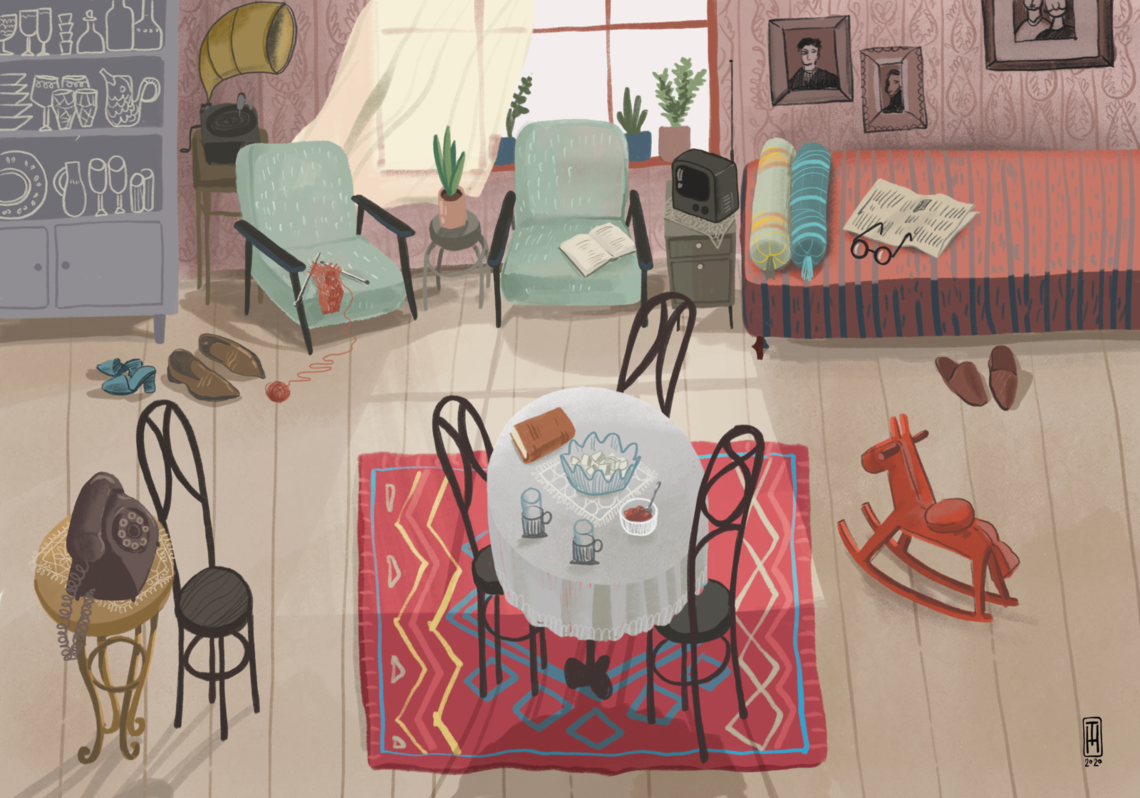
* * *
Stay home, they tell you, but you have no home; stay away, they tell you, you could be hosting the virus. Many odysseys ended with a return home, but you remained a broke and broken arrival, someone with no foundation or direction.
You are real, or rather, you are an archetype. You wander about in our streets, spend the night beneath Davtashen bridge, while I sit with a full stomach in my hundred-square-meter space in our three-story house on Hovsep Emin Street, where I occupy a complete floor, from the balcony of which I can see Mount Ararat, with no plane trees or storks, and the written house I think I have built you in the sky.
Is it worth turning you into the story of this house my father built and this home my mother made, where “staying home” turned from a curse into a blessing with wording as simple as could be – a family under one roof where everyone has their own personal space, where family members come “visit” you and always knock before entering, where mulberries and figs grow in a cozy closed yard and a rich bush of roses is blooming with flowers in greater number than ever during this mad month of May? This house, which is a music hall, because my brother plays the guitar and his wife is a singer, which is the studio of my industrious father, the workshop of my creative mother, and the playground of their grandchild, which managed in these times to keep at home even a street rat like me, alas, did not open its doors for you.
It is not obvious at all, not in any manner or means is it clear, whether it was I who ended up lost, or you. In any case, you dropped out of my sight during these days of quarantine. Sometimes, a policeman would appear in my mind and demand the completed form[11] (I would always write something different for your address of origin—from “under the bridge” to “the edges of life” or “the ghost writer’s depths”—and your destination would always be “the nearest trashcan,” my imagination never managed to provide anything better) after which you were taken to a shelter (given that even street dogs in Yerevan had such places, I was convinced that homeless people would not be left outside in such times) where they would take your temperature, give you food and drink, take care of you, and allay my guilt.
And yesterday, I saw you again, digging through a trashcan on a street corner, no mask or gloves. The pandemic had made an abyss of the social distance between us (there was never anyone in your embrace when our paths had crossed before) and I did not approach you, even though I had decided to take that step when we met again… What would I say? Stay home? Come home?
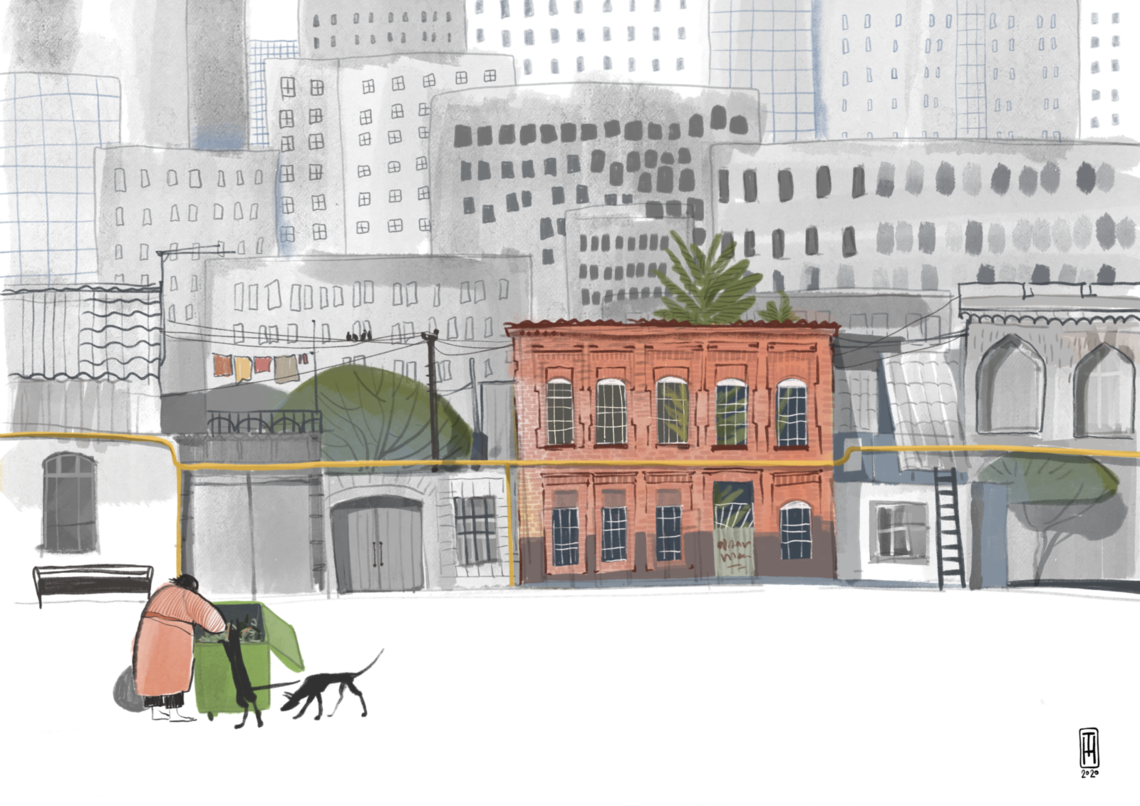
-------------------
[1] Come Home was the name of a program initiated by the Ministry of the Diaspora of Armenia in 2009. The new government following the 2018 Velvet Revolution shut down the Ministry of the Diaspora as a separate entity.
[2] A line from “The Best Home”, a poem by Hovhannes Toumanian (or Tumanyan) (1869-1923) where a young boy travels the world seeking the best place to live, only to discover that it is his own “ugly cottage, this old cottage, by the river’s lee, under a tree.” An English translation of this poem by Hayk Katvarian is available in Tumanyan’s “Selected Works” published on the occasion of the 150th anniversary of his birth by the Hovhannes Toumanian Museum in 2019.
[3] An administrative region in Soviet Armenia, near Lake Sevan.
[4] Los ricos también lloran, a Mexican telenovela that was very popular among Armenian television viewers in the post-Soviet period.
[5] This is a reference to events in 2020, when the Firdus district of Yerevan, which contains some of the city’s oldest buildings, was marked for demolition.
[6] The title of a book and popular television program by Artashes Kalantarian (1931-1991).
[7] A short story by writer Hrant Matevossian (1935-2002) adopted into a 1969 film with the same title (sometimes also called We and Our Mountains in English, with Matevossian as the screenplay author) as well as the name of an iconic monument in Stepanakert, the capital of the unrecognized Republic of Artsakh.
[8] Part of a phrase used by the leader of the Armenian Velvet Revolution and Prime Minister of Armenia since 2018, Nikol Pashinyan. “The future of this country depends on one person, and that one is you…”
[9] William Saroyan (1908-1981), an Armenian-American novelist, playwright, and short story writer.
[10] A quote from one of the poems written by Nikol Pashinyan (see footnote 8).
[11] During the coronavirus lockdown in Armenia in March-April 2020, the Government required that people leaving home had to fill and carry a brief form stating their address of origin, destination, and purpose.
In cooperation with the Heinrich Boell Foundation Yerevan Office South Caucasus Region.
Also read
Zarmanazan
By Gevorg Ter-Gabrielyan
This is neither a true story nor a real story. But it could be either if fate ever stepped in to deliver a surprising lesson on toxic masculinity.
The Quilted Refuge
By Vigen Galstyan
A story weaving together the fragments of a woman’s life who organized the chaos of reality into a sensible and livable realm offhandedly called “home” but no one recognized it until she was gone.


